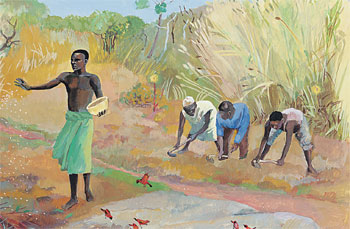Editor's note: Faith & Leadership offers sermons that shed light on issues of Christian leadership. Jason Byassee delivered this sermon on July 17, 2011, at Boone United Methodist Church in Boone, N.C.
The image above is from Life of Jesus Mafa, an organization that has developed 62 images from the New Testament in an African context. The artworks were created by a French team in response to the desire expressed by the Mafa Christian community of Cameroon. Used with permission, all rights reserved.
You will notice as I read the Gospel that Jesus addresses a rather irregular congregation here. In our day, we have our normal religious gatherings -- in buildings like this, with seats like these, an ordained person like me, worship this or that way.
In Jesus’ day, they had similar conventions, and Jesus observes them at times -- in Luke chapter 4, he goes to synagogue, reads from the scroll [of Isaiah] and sits down to preach. (Preachers sat back then; everybody else stood up -- perhaps a change we should instigate.)
But here in Matthew 13, Jesus walks by the lake. His congregation is everybody else by the lake, his pulpit is a boat, his altar rail is the waves.
Hear this word:
Hear then the parable of the sower. When anyone hears the word of the kingdom and does not understand it, the evil one comes and snatches away what is sown in the heart; this is what was sown on the path. As for what was sown on rocky ground, this is the one who hears the word and immediately receives it with joy; yet such a person has no root, but endures only for a while, and when trouble or persecution arises on account of the word, that person immediately falls away. As for what was sown among thorns, this is the one who hears the word, but the cares of the world and the lure of wealth choke the word, and it yields nothing. But as for what was sown on good soil, this is the one who hears the word and understands it, who indeed bears fruit and yields, in one case a hundredfold, in another sixty, and in another thirty. (NRSV)
So what kind of soil are you?
I first had this question put to me on a mission trip to inner-city Boston. My youth group was there visiting a pastor in Roxbury who had a remarkable ministry to gang members. He did something extraordinary. He became their friends. Got to know the gang members, learned their needs, tried to suggest other ways to live than the street. And here he was asking us, in his church’s Sunday school room, what kind of soil we wealthy kids from the suburbs were.
My friends and I looked around at each other. We knew what the right answer was. The parable lays it all out clearly. Who wants to be among those who fail to produce a crop? But the right answer was also wrong. Who could claim they’re good soil -- producing 30, 60, 100 times what was planted?
So most of us hedged our bets. “I think I’m a little bit rocky,” one said. “Maybe a few thorns,” another said. We wanted to say something religious, but we also didn’t want to lie.
Don’t you hate those Sunday school sorts of questions?
Another African-American preacher I heard on this passage also wanted to know what sort of soil we are. Are we the path? Rocky soil? Thorny soil? Or good soil? But then he made a turn I didn’t expect. He said in his neighborhood there aren’t a lot of kids with advantages. Most were poor; those who weren’t still had bad schools to attend; those who made it through those had few job prospects.
“There are thorns and rocks all around,” he preached. “We have to get our hands in the soil. We have to dig in that dirt. We have to pull up those rocks. We have to root out those thorns. It’ll hurt,” he promised, “but if we do, we can turn bad soil into good, so that it’ll bear a crop for Jesus!”
Look at this image. There’s not only Jesus sowing; there are people laboring, preparing the soil. In this way of looking at it, the question isn’t whether we’re good or bad or rocky or thorny soil. The question is, who around us has obstacles in their way? Then we dig in deep into their lives, getting our hands dirty, cut, nicked, pulling up roots and rocks and thorns, so that Jesus’ seed can take root and a harvest can follow.
So who here is willing to get their hands a little dirty and a little banged up and cut up for Jesus? If your hands hurt from the thorns, look over at the one gardening with you and notice that his hands already have holes in them.
Some wise teachers in the ancient church asked about the different kinds of bad soil.
“Some seed fell on the path,” Jesus said. The path is sunbaked. It has no moisture, so it doesn’t open up for the word, and the birds come and eat the seed. That’s us when we fail to understand the word. The moisture that waters the soil is humility. When we don’t soften our hearts with humility, they fail to open to God’s word, and the birds come and eat the seed.
What about the rocky soil? Jesus says that’s a person who receives the word of the kingdom with joy but endures only for a little while and then falls away with any trouble or persecution on account of the word.
There are versions of the Christian faith out there that promise smooth sailing: if you believe this way or give that gift or claim something or other, your bank account will be full and your sorrows empty.
Those versions of the faith must have trouble with Jesus -- who promises persecutions here, troubles on account of the word. Grapes have to be pressed to become wine, olives have to be squashed to become oil, grain has to be threshed to become bread, Jesus has to be crucified to save us -- and we don’t think discipleship will hurt?
One of the ancient teachers, Gregory the Great (quite a nickname), said that the good we do has no value if we fail to be patient with the evildoing of our neighbor.
Did you hear that? The good we do has no value if we fail to be patient with the evildoing of our neighbor. God expects us to bear fruit. And he expects us to bear fruit surrounded by rocks. The more we dig in the soil, the bloodier our hands will be.
I remember meeting a woman who was really struggling with another woman in her congregation. Both were committed volunteers, serving the church with their time and treasure. And they couldn’t get along. It’s a story as old as Cain and Abel, Mary and Martha.
And she said something wonderful about her difficult sister in Christ. She’d been reflecting on the Lord’s Prayer -- “Forgive us our trespasses, as we forgive those ...” -- and she said, “You know what? That woman is going to make a Christian out of me.” Indeed she might.
The church is the place where we bear fruit surrounded by rocks -- our sisters and brothers in Christ -- and where we’re rocks to other people. And we hope that God not only uses us to make Christians out of others but uses others to make Christians out of us -- people who forgive as Jesus commands.
Thorny soil -- Jesus says the thorns in the soil are “the cares of the world and the lure of wealth.” They choke the word, so it yields nothing. I don’t know about you, friends, but when I reached a certain age, I started thinking about money more often than near about anything else. Not that I wanted to be rich; if I wanted to try for that, other professions are better bets than preaching.
It’s more subtle than that. I’m just planning, trying to be frugal and wise. Have we paid off the right bills first? Are we saving enough? Those are good questions to ask. But have you ever noticed they can take over your thinking, your worrying, your living? Wealth is like thorns because it pricks you, bites at you. It could be gone tomorrow, or you could have plenty of it tomorrow and it won’t make you happy.
John D. Rockefeller, when he was the wealthiest man in the world, was asked how much money was enough. And he said what you and I must also think: “Just a little bit more.” Those are thorns, wrapped around us, choking us off from being fruitful.
And then some soil yields an abundance -- 30, 60, 100 times what was sown.
The psalmist we heard from earlier hopes that those who sow in tears may one day reap with shouts of joy. In cultures that go hungry a lot, say in modern Africa or ancient Israel, parents often have a difficult choice. They can give their children grain now, or they can plant that grain in the ground and hope for a crop in the future -- and ask their children to go hungry in the meantime.
So as they sow that grain they weep, as their children’s hungry cries echo in their ears. They are putting in the ground seed that could be in their hungry children’s bellies right now. But if they don’t sacrifice now for the future, their children will be more hungry -- or even die -- later.
The psalmist promises that those who sow in tears will reap in joy. With 30, 60, 100 times what they planted. God makes good on his promises. Don’t think that sowing doesn’t cost the sower anything. He might be crying as he plants. That seed has to break open, die. And then we wait and see what grows. And while we wait for that huge crop, our children’s cries might ring in our ears.
These are all good readings of the parable, ones I commend to you. But here’s another reading of this parable: Who is this farmer? And what kind of farmer is he?
I don’t know much about gardening or farming. Those of you with tough, callused hands know this better than I do -- you don’t farm the way the Gospel describes, do you? Jesus describes a sower who goes out and throws seed everywhere. On the sidewalk, over in the thorn bushes, in the rocky mountainside. This isn’t the sort of precision of one who wants every seed to succeed.
The farmer doesn’t fertilize the soil, dig around it, apply insecticide, carefully cover the seed over.
He just flings seed everywhere -- on the highway, into the bushes, on land that’s his and land that’s not -- indiscriminately. Who knows where it’ll land? If we knew each other better already, I’d be tempted to throw seed from up here, on the carpet, on some of y’all -- I mean, who knows where it might spring up and give us a crop?
A friend of mine once was a rural pastor for a little while, and he had designs on entering a county fair and impressing his people. So he carried a handful of seed out of the parsonage, prepared some rows out back, planted, watered, tended and waited. And nothing happened in the field at all.
But something did happen back along the walkway. Apparently, he’d dropped one or more of the seeds while he was walking, and in that very spot by his walkway sprang up the most beautiful-looking squash he’d ever seen.
His farmer parishioners taught him that’s called a “volunteer squash” -- one that comes up where you didn’t plant, by accident. And lo and behold, that volunteer was better than any he could have planted on his own.
In that agricultural accident, my friend was a little like God. God just flings seed everyplace. Apparently, God has seed to spare and likes to see what can grow where it’s not supposed to grow.
And what about around here? I wonder what ministries we have that were a wild idea someone grew, a volunteer squash that came up, something somebody thought up that sounded crazy at first, and then a little less crazy, then sort of awesome, and then it worked? That’s how God works, friends!
Someone says, “Hey, I think we could have a disaster relief team here at Boone Methodist.” And we do. Or someone says, “Hey, I think this church can support a village in Guatemala.” Check. Or, “We can have an effect on the global sex trade and help girls trapped in it.” Now we are.
Maybe we could have a prize for the best crazy, unattainable idea anyone can dream up around here. It’s our God who throws seed everywhere. Some of it took root in you and me, or we wouldn’t be here.
Where can we throw seed now?
Many of our most cherished traditions in history were originally crazy ideas no one had ever thought about. Earlier this summer, I visited a church John Wesley once served in Savannah, Ga. Wesley had a terrible two years there; he fell in love with a woman who didn’t love him back, kicked her out of his church (not recommended) and had to leave town in a hurry.
By every standard, Wesley was a failure as a missionary in the colonies. But he did two things that have stood the test of time. He published the first English hymnal in the American colonies. The hymnals in our pews and the lines on our screen are descended from Wesley’s effort amidst failure.
Wesley also started the first Sunday school in North America. No one had ever thought to before him. But there were kids in Savannah who needed to learn to read and write (there were no other schools they could afford), the basics of faith, how much Jesus loves them. Now Sunday school seems so normal we can’t imagine church without it.
But it was a wild idea once, a seed cast on rocks or roots or good, good soil. The next pastor at that church in Georgia was George Whitefield, maybe the best preacher in his century (pretty good run of pastors there).
Whitefield founded the first church orphanage in the New World. Can you imagine a time when the church didn’t support orphans? It hadn’t until then.
These volunteer squashes are even older than that: Do you know the Christian church invented the hospital? There was no such thing as a hospital until the church came along. But Jesus healed sick people, and we wanted to do the same, so that idea took root, I’d say.
The church invented the university, a place to learn not only all the knowledge there was but how it all fit together. Another seed that bore some fruit.
The church invented, well, the church! Never before (and arguably never since) had there been a transnational body, where race and gender and tribe didn’t determine who we are, but only Jesus Christ does. We’ve failed at that plenty, as the hospital and the university have failed plenty.
But the point is that there was a time when no one had thought of it. Now we can’t imagine the world, or even Boone, N.C., without a university, a hospital, a church.
What wild, unexpected seeds might you be holding in your hands, friends?
Interesting things happen in the Bible when God starts farming. God creates Adam and Eve and puts them where? In a garden. When Jesus is raised from the dead, Mary sees him, doesn’t recognize him, and mistakes him for a gardener.
Why? Well, some have said that maybe the risen Christ was gardening. Maybe he had dirt under his fingernails, was wearing overalls. And here Jesus is once again a strange sort of gardener, flinging seeds everywhere.
And here’s the really radical thing, friends. Jesus takes our hand, opens it up, and as he does so, we notice his hands are not only callused and bruised; they’re also pierced, with seeds in the holes left by the nails. Then he pours some of that precious seed from his pierced palms into ours, and we send seeds everywhere that cost God everything. Let’s see what comes up. Amen.













